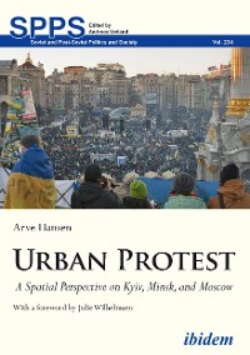Читать книгу Urban Protest - Arve Hansen - Страница 5
A Note on Language
ОглавлениеThis book describes events, people, and places mainly from three Eastern Slavic countries: Ukraine, Belarus, and Russia. Each of these countries uses the Cyrillic script and has its own national language, as well as linguistic variations encompassing proper nouns: yet, for historical reasons, Russian has become the lingua franca of the region. The long history of Russian hegemony and long periods of russification have also led to the widespread international adoption of Russian forms for Ukrainian and Belarusian proper nouns. For these reasons, the Ukrainian capital is usually known as Kiev (from Rus. Киев), rather than Kyiv (from Ukr. Київ). Likewise, the Belarusian president is known as Lukashenko (Rus.: Лукашенко), not Lukashenka (Bel.: Лукашенка); while the conflict region in Eastern Ukraine is known as Donbass (Russian: Донбасс), not Donbas (Ukrainian: Донбас). Conversely, some proper nouns are known by their national variants, as is the case with the current Ukrainian president Volodymyr Zelenskyi (Ukr.: Володимир Зеленський), not Vladimir Zelenskii (Rus.: Владимир Зеленский), and Hrodna for the town in Western Belarus (Bel.: Гродна), rather than Grodno (Rus.: Гродно).
Scholars are often advised to use the transliterations most predominant in English, as these are most recognisable to the majority of readers. Yet such a language policy often leads to inconsistencies, and readers asking why some proper nouns are based on the Russian forms while others are not. As far as I can see, there are only two solutions to this problem. Either the scholar consistently and exclusively transliterates from the relevant Russian forms; or, conversely, they transliterate all proper nouns from the local languages. The former solution is often used because it is more consistent with the predominant name forms in English. (Another reason might be that most scholars within the field have a level of proficiency in Russian, but limited knowledge of the other two languages). The choice of Russian could additionally be justified by the large prevalence of Russophone speakers in all three countries. Although there is a precedent for the former solution in East Slavic area studies, the latter is not unheard-of, and scholars such as the Canadian historian David R. Marples (2004) and the British political scientist Taras Kuzio (2005) use the national variants of proper nouns.
I have chosen the latter option. Thus, the transliterations of proper nouns found in this book reflect their national origins. The reader will also encounter proper nouns that are less frequently used, such as Kyiv and Lukashenka (rather than Kiev and Lukashenko). However, I have retained the familiar variants of some terms and proper nouns in order to avoid confusion (e.g. Kievan Rus’, not Kievskaia Rus’ from Rus. Киевская Русь; or Kyivs’ka Rus’ from Ukr. Київська Русь).
I have used the ALA-LC Romanisation tables from The Library of Congress for all Ukrainian, Belarusian, and Russian words, with some exceptions. I have avoided confusing typographic ligatures and diacritical marks, such as i͡e for the Russian е; and ï for the Ukrainian ї. Similarly, I have kept some internationally recognised variants that are too omnipresent to change: for example, the former Russian president is Boris Yeltsin rather than Ieltsin (or, with ligatures, I͡Elt͡sin).
To complicate the matter further, in Belarus, there are three written languages: Russian and Belarusian, both of which are official languages, and the classic Belarusian Tarashkevitsa. The name of the president could be transliterated as Aleksandr Lukashenko (Russian); Aliaksandr Lukashenka (Belarusian); and Aliaksandar Lukashenka (Belarusian Tarashkevitsa). I use the official Belarusian (Aliaksandr) for proper nouns. Please note that the Belarusian letter ў is transliterated as w, not u.
For consistency’s sake, I use the translated forms of place names in this book (i.e. October Square, not Kastrychnitskaia). A notable exception is Maidan (Ukr.: square), which is used both instead of the longer original (Maidan Nezalezhnosti) and the translation (Independence Square), the reason being that Maidan has become a widely recognised word in the West, even among non-Slavists.
All translations are my own unless stated otherwise.
